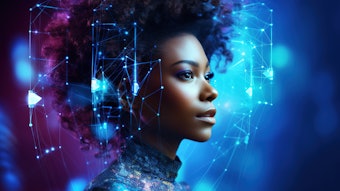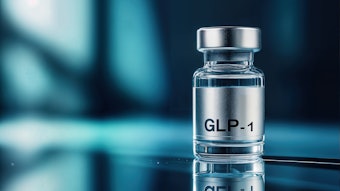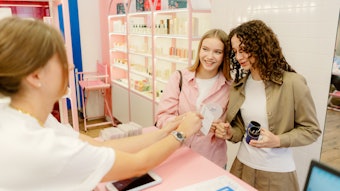
Psychodermatology and mindful beauty are among today’s hottest concepts in cosmetics and personal care. Glamour predicted psychodermatology was “about to trend” in 2023, defining it as “how our thoughts affect our skin.”1 In 2022, the same source called out “mindful beauty” as “the new trend that will give you a glow, inside and out.”2
While these concepts may have been new to consumers, behind the scenes, the industry was already working on them. The presentation of the 2021 Maison G. de Navarre Medal Award, during the IFSCC 2023 Congress, to Zuo Jinhui, Ph.D. (ZJ), of Shanghai Pechoin Daily Chemical Company Ltd., for his essay titled, “New Anti-aging Strategy of Cosmetics: from Skin Physiology to Skin ‘Psychology’” exemplifies this. In the following interview, Jinhui shares insights from the paper with Cosmetics & Toiletries (C&T), including the potential for psychodermatology and mindful beauty.
In addition, Jinhui touches on how neurocosmetics fit into this space and AI’s potential to advance its implementation – two emerging areas he has focused on since receiving the award. Indeed, neurocosmetics, according to Skyquest, are expected to surpass US $2.69 billion, expanding at a CAGR of 8.4% from 2023 – 2030.3 And the AI beauty market is predicted to reach US $15.75 billion by 2031, increasing at a CAGR of 19.6% from 2023, per Insight Ace Analytic.4 Intertwining these newly cultivated branches of cosmetics demonstrates how the future growth of the industry is no longer on the horizon, but within arm’s reach.
C&T: Please summarize your award-winning paper and describe your views on psychodermatology and mindful beauty to advance cosmetics. Where is there untapped potential? How might these concepts be implemented?
ZJ: This paper gives a general overview of the connection between skin physiology and psychology, and how cosmetics can help us age gracefully and happily. It discusses the benefits of mindfulness and neurocosmetics in slowing down the aging process, and how the "five senses" of cosmetics can have a positive psychological effect on our skin. It also mentions the potential for real-time emotional monitoring devices to customize cosmetics according to emotion.
The paper also provides examples of the mutual influence between emotions and skin conditions. Positive emotions or the mindful behaviors that can generate positive emotions can indeed make our skin healthier and slow down the rate of skin aging. Especially in areas such as stress reduction, inflammation control and improved skin care habits. It has great potential.
However, while there is growing interest, more research is needed to fully understand the mechanisms through which mindfulness affects skin health. Identifying specific pathways can open avenues for targeted interventions.
The full potential of these concepts could be tapped into by integrating mindfulness practices into daily skin care routines. This might involve combining mindfulness exercises with skin care rituals to enhance both mental well-being and skin health. Also, tailoring psychodermatological interventions based on individual differences in stress response and mindfulness preferences could optimize outcomes. Personalized approaches may even unlock untapped potential for specific demographics.
To implement these concepts, technologies such as mobile apps and wearable devices could facilitate mindfulness practices and track their impact on stress levels and skin conditions. These technologies also could be applied to psychodermatological approaches to enhance accessibility and effectiveness.
To fully optimize effects, collaboration between dermatologists, psychologists, mindfulness practitioners and skin care experts is essential. This multidisciplinary approach can generate comprehensive strategies for anti-aging and well-aging effects.
 Neurocosmetics used to be more of a marketing strategy but now, they can bring more satisfaction to consumers in terms of skin care benefits.Photo credit: triocean
Neurocosmetics used to be more of a marketing strategy but now, they can bring more satisfaction to consumers in terms of skin care benefits.Photo credit: triocean
C&T: Why are neurocosmetics relevant to beauty consumers today? What has changed in recent years?
ZJ: Neurocosmetics used to be more of a marketing strategy but now, they can bring more satisfaction to consumers in terms of skin care benefits. The relevance of neurocosmetics in the beauty industry today can be attributed to many things: a deeper understanding of the brain-skin connection, a shift toward holistic beauty, increased focus on mental well-being, advances in ingredient technology, consumer demand for personalization, the influence of technology and social media, and innovative marketing strategies. As these factors continue to evolve, neurocosmetics are likely to play an increasingly prominent role in the beauty landscape.
C&T: How does skin "psychology" compare to ancient belief systems such as TCM or ayurveda?
ZJ: While skin "psychology" is a more recent term and concept, its alignment with ancient belief systems like traditional Chinese medicine (TCM) and ayurveda highlights the enduring recognition of the interconnectedness of mental, emotional and physical aspects of health. In this sense, it can be seen as a contemporary interpretation of age-old wisdom that acknowledges the holistic nature of well-being.
CT: How is AI enabling a deeper look into the field of skin psychology? How could it be further leveraged?
ZJ: AI enables a deeper look into skin psychology by analyzing vast datasets, providing personalized skin care recommendations, monitoring skin changes, simulating the impact of psychological factors, supporting mental wellness, integrating biometric feedback and enhancing diagnostics in dermatology. Future applications include more nuanced insights, visualizing mind-skin connections and seamlessly integrating psychological data for tailored interventions and holistic well-being.
Following are several examples of current and potential AI applications to support and advance mindful beauty and psychodermatology.
1. Data analysis and pattern recognition: Currently, AI can analyze vast amounts of data, including information on skin conditions, lifestyle factors and emotional states. It can identify patterns and correlations that may be challenging for humans to discern. In the future, advanced AI algorithms could provide more nuanced insights by detecting subtle patterns and relationships within complex datasets. This could lead to a deeper understanding of the specific interactions between psychological factors and skin health.
 AI could integrate psychological and emotional data to offer even more personalized recommendations. This could mean considering stress levels, emotional well-being and lifestyle factors.Photo credit: Drazen
AI could integrate psychological and emotional data to offer even more personalized recommendations. This could mean considering stress levels, emotional well-being and lifestyle factors.Photo credit: Drazen
2. Personalized skin care recommendations: AI is used today to provide personalized skin care recommendations based on individual skin types and concerns. In the future, AI could integrate psychological and emotional data to offer even more personalized recommendations. This could mean considering stress levels, emotional well-being and lifestyle factors to tailor skin care routines that address both the physical and emotional aspects of skin health.
3. Monitoring skin changes: Currently, AI-driven tools can monitor and analyze changes in skin conditions over time, helping individuals track improvements or worsening of their skin health. Eventually, AI could incorporate data on psychological states to correlate emotional fluctuations with changes in skin conditions. This could contribute to a more comprehensive understanding of the mind-skin connection.
4. Virtual try-ons and simulation: AI is used now for virtual try-ons, allowing consumers to visualize the effects of skin care and cosmetics on their skin. In the future, it could simulate the impact of psychological factors on skin appearance; for example, it could show how stress or mood changes might influence the skin's radiance, providing users with a visual representation of the mind-skin connection.
5. Biometric feedback integration: Currently, wearable devices can collect biometric data such as heart rate and sleep patterns. Moving forward, AI could integrate this biometric data with skin health information and psychological states, offering a holistic view of an individual's well-being. Predictive modeling might even anticipate periods of heightened stress that could impact the skin.
6. Advanced imaging and diagnostics: AI is also used today in dermatology for image analysis and diagnostics. In the future, it could further enhance diagnostic capabilities by considering psychological factors. For instance, it might analyze facial expressions or skin color changes associated with emotional states to provide additional diagnostic insights.
C&T: What is your response to having won the Maison G. de Navarre Award?
ZJ: When I received this award a few years ago, it was somewhat unexpected, and it filled me with tremendous excitement. At the time, I was just a newcomer to the cosmetics industry with two years of experience. Winning the award significantly boosted my career and influence within the company. It marked a promising beginning, instilling great confidence and providing opportunities to interact with many outstanding industry seniors.
Recently, I've transitioned from being a novice to stepping onto the stage as a speaker, delivering academic presentations in public forums. Additionally, I am actively leveraging my influence to promote IFSCC in China, especially among student communities, with the hope of encouraging more ambitious young individuals to engage in international scientific exchanges within the cosmetics industry. In summary, this award has brought me immense honor and has entrusted me with the responsibility of promoting the excellence of IFSCC.
References
1. Turner, E. (2023, Jan 2). Psychodermatology looks at how our thoughts affect our skin, and it's about to trend for 2023. Glamour. Available at https://www.glamourmagazine.co.uk/article/psychodermatology-uk-what-to-know
2. London, B. (2022, Mar 4). 'Mindful beauty' is the new trend that will give you a glow inside and out. Glamour. Available at https://www.glamourmagazine.co.uk/article/what-is-mindful-beauty
3. SkyQuest Technology Consulting Pvt. Ltd. (2023, Mar 1). Neurocosmetics market is expected to surpass USD 2.69 billion by 2030 at a CAGR of 8.4% from 2023 to 2030; Growing awareness among consumers about the role of neuroscience in skin care and beauty products to elevate market growth. Available at http://tinyurl.com/urneavn5
4. Insight Ace Analytic. (2023, Oct 18). Artificial intelligence (AI) in beauty and cosmetics market size, share and trends analysis report by service/product, by application (skin care, hair care, makeup, fragrances, others), by region and segment forecasts, 2023-2031. Available at https://www.insightaceanalytic.com/report/global-artificial-intelligence-ai-in-beauty-and-cosmetics-market/1051











